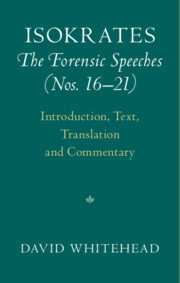
-
Select format
-
- Publisher:
- Cambridge University Press
- Publication date:
- April 2022
- April 2022
- ISBN:
- 9781009214506
- Dimensions:
- Weight & Pages:
- Dimensions:
- Weight & Pages:
- Subjects:
- Ancient History, Classical Studies, Classical Literature
You may already have access via personal or institutional login- Subjects:
- Ancient History, Classical Studies, Classical Literature
Book description
The Athenian Isokrates (436–338 BC) is well-known for his long career as an educator and pundit; but originally he wrote 'forensic' speeches, i.e. for delivery in court. Six of them survive (five from Athens, one from Aigina), on issues including assault, fraud and inheritance. Here for the first time, after a General Introduction, they are presented and analysed in depth as a self-contained group. The Greek text and a facing English translation - both new - are augmented by commentaries which juxtapose this material with other surviving writers in the genre (and with Isocrates' own later output). In the process, too, the speeches' historical background, personnel, legal context, rhetorical strategies and all other relevant topics are explored.
Contents
Metrics
Full text views
Full text views help Loading metrics...
Loading metrics...
* Views captured on Cambridge Core between #date#. This data will be updated every 24 hours.
Usage data cannot currently be displayed.
Accessibility standard: Unknown
Why this information is here
This section outlines the accessibility features of this content - including support for screen readers, full keyboard navigation and high-contrast display options. This may not be relevant for you.
Accessibility Information
Accessibility compliance for the PDF of this book is currently unknown and may be updated in the future.

